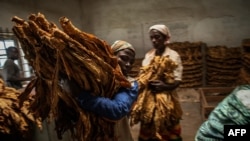Malawian President Lazarus Chakwera has announced reforms his administration will take to create better conditions and rights for workers in his country. Presiding over a commemoration for Internationals Workers Day Saturday at his State House in Blantyre, Chakwera noted that a decent work environment and workers’ rights are compromised in Malawi.
Chakwera started the event by leading a solidarity walk within the State House premises with various representatives of workers’ unions in Malawi.
In his speech, Chakwera said he is aware of labor-related challenges which have come about because of the impact of the COVID-19 pandemic.
“The fact is that the pandemic has been hard for all workers, costly for most workers, life threatening for many, devastating and fatal for some. And we must tailor our assistance to workers regarding these things without creating a false equivalence between the various scenarios. It makes sense to treat those workers as priority for personal and social protection,” he said.
Chakwera, who came into power in June following a rerun vote, announced reforms his administration will make to safeguard good working conditions for Malawian workers.
“In the new Malawi we are building, no worker should be paid below the new minimum wage ($62 per month) we have put into effect since I took office. In the new Malawi we are building, tenancy labor, forced labor and child labor will all be abolished. In the new Malawi were building, no foreign person who employs Malawians and mistreats them, will continue to have the privilege of living here,” Chakwera said.
Luther Mambala, president of the Malawi Congress of Trade Union, says the government should also address salary gaps between expatriate workers and local employees.
“If you have got the same qualification or even higher qualification than somebody coming from foreign countries, he will actually be getting more salary than you because you are a Malawian. We said it’s not a sin to be a Malawian. So, Malawians should be treated equality to that particular person and not all expatriates have got the expertise that Malawians don’t have,” he said.
Mambala added that the government should consider enacting legislation that would protect workers who are laid off because of situations like COVID-19. Employees from various industries within the private sector also shared difficulties they encounter in the workplace.
Gladys Gondwe, who works for a manufacturing company in Blantyre, complained about working conditions.
“Workers like me from the private sector are exploited. They will give you work that they know you can’t finish at the specific time. So, you do the work and you add some hours, but they will say, 'We don’t have that overtime policy.’ To me that’s exploiting workers,” she said.
Another concern, Gondwe said, is a lack of medical insurance for most workers in the private sector.
“It’s pathetic that workers will work hard but by the end of the day they will find it difficult to get medical help, so, if government could, make it mandatory for all private sectors [employers] to offer medical insurance to their workers,” she said.
Chakwera said the government is working on new labor laws that will address concerns raised by workers.




